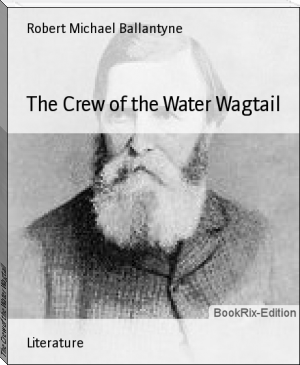The Crew of the Water Wagtail, R. M. Ballantyne [books to improve english .TXT] 📗

- Author: R. M. Ballantyne
Book online «The Crew of the Water Wagtail, R. M. Ballantyne [books to improve english .TXT] 📗». Author R. M. Ballantyne
One day, some time after leaving Hendrick’s camp on the great lake, Captain Trench and his son, with Paul Burns and the hunter, halted to rest on the summit of a cliff from which they could obtain a magnificent view of the country lying beyond.
They had by that time passed over the rich grassland with its park-like plains, its lakes and streams and belts of woodland, and had entered upon that mountainous region which lies towards the southwesterly portion of the island.
“Hendrick,” said Paul, as he gazed with admiration on the wild scene before him, “I have now seen enough to know that this land is most suitable for the abode of man. The soil is admirable; the woods contain magnificent timber; fish, flesh, and fowl are plentiful; coal exists in, I should think, extensive fields, while there are indications in many places of great mineral wealth, especially copper. Besides this, the land, you tell me, is pierced by innumerable bays, inlets, fords, and natural harbours; and, to crown all, the climate, except on some parts of the coast, is exceedingly good. Now it seems to me that these facts ought to be made known in England, and that our King should not only take possession, but should send out colonists to settle all over this island and develop its resources. If permitted, it will be my part to finish this exploration and carry home the news.”
Hendrick did not reply for a few minutes, then a faint sigh escaped him as he replied—
“No doubt what you say is just, and I doubt not that these plains and hills will one day resound with the activities of civilised life: the plough will obliterate the deer-tracks, the axe will lay low the forests, and the lowing of cattle and the bark of dogs will replace the trumpeting of the wild-goose and the cry of plover; but when the change begins to come, I will strike my tent and go to the great unknown lands of the west, for I cannot bear the clatter and the strife of men.”
Paul was about to reply, when an arrow whizzed through the air, pierced the sleeve of his coat, scratched his left arm slightly as it passed, and quivered in a tree behind them.
Leaping up, each member of the party sprang for shelter behind a neighbouring tree.
At the same moment there arose a terrible cry, as of men rushing to attack each other. The form of the ground prevented our travellers from seeing the combatants, though the sound of their strife proved them to be close at hand. Suddenly Hendrick left the tree behind which he had taken shelter, and, running towards a precipitous bank or cliff, called to his companions to follow. They obeyed at once.
“I fear,” he said, as Paul ran up alongside of him, “that I know the meaning of this. Some of the voices sound familiar to me. That arrow was not, I think, discharged at us. We shall be wanted here. May I count on you?”
“You may,” said Paul. “I cannot doubt that your cause must be a just one.”
“I’m with you!” exclaimed Master Trench, plucking the hatchet from his son’s belt—a weapon that the youngster could well spare, as the bludgeon and the bow were still left to him.
Hendrick had spoken in quick, sharp tones, for he was evidently much excited. On reaching the crest of a rising ground he looked cautiously over it.
“As I thought!” he said; “my wife’s relations are attacked by savages from Labrador. Come, follow me!”
He ran swiftly round the base of the rising ground, not giving his comrades time even to see the combatants to whom he referred.
Suddenly they came in full sight of perhaps the most terrible sight that our fallen world can present—two bands of armed men, mad with rage, engaged in the fiendish work of butchering each other.
In the immediate foreground two powerful Indians were struggling each to plant a short spear in the other’s heart. One, who was shorter than the other but equally powerful, was making a desperate effort to wrench his right hand from his foe’s grasp, and another foe was on the point of stabbing the short man in the back, when the white men appeared on the scene. Paul, the captain, and Oliver, although ready with arrow and bolt hesitated, for they knew not which to regard as foes, and which as friends. No such difficulty, however, interfered with Hendrick, who sent an arrow into the brain of the savage who meant to strike from behind. At the same instant the short warrior succeeded in his effort; his spear flashed upwards, and the next moment his tall enemy fell to rise no more.
Hendrick, who seemed to have been transformed into a human tiger, rushed to the attack with a shout and a display of fury that for a moment arrested the fight. The short Indian, whose life he had just saved, bestowed on him and his companions one look of surprise, and joined him in the rush. Captain Trench, whose combative tendencies were easily aroused, joined them with a roar which was somewhat intensified by the fact that he was still a little uncertain as to which was “the enemy.” Oliver relieved his overcharged bosom by an involuntary shriek or howl, that rose high and shrill above the tumult, as he followed suit, whirling his bludgeon with some difficulty round his head.
The combined effect of all this was to strike terror into the enemy who, turning short round, fled precipitately, and were followed for a considerable distance by some of the victorious Indians.
On returning from the pursuit, Hendrick introduced the short Indian as his wife’s cousin, who, with a party of hunters, had been out for a supply of fresh meat when attacked by the Labrador savages.
“It is an old feud,” remarked Hendrick, as he and Paul sat a little apart that evening, while their comrades assisted the Indians to prepare supper; “an old feud. Oh! war—war! There is no place of rest from it, I fear, in this world.”
The hunter’s tone was so sad that Paul looked at him inquiringly.
“You are surprised,” said his companion, “that I should long thus for escape from the warring passions of men, but if you knew what reason I have for hating war, you would not wonder. Listen! Many years ago I went with my wife and child to visit a kinsman in the Scottish Highlands. I need scarcely tell you that it was not my present wife and child. She was young, fair, faultless in person and disposition. Our little daughter resembled her in all respects. There chanced to be a miserable feud existing between my relative and a neighbouring chief. It originated in some disputed boundary, and always smouldered, like a subdued volcano, but occasionally broke forth in open warfare. At the time of my visit my kinsman, who was a bachelor, had gone to transact some business at a town not far distant, leaving a message for me to follow him as he required my assistance in some family arrangements, and meant to return home the same night. I went, leaving my wife and child in the castle. That very night my kinsman’s foe—knowing nothing of my arrival—came to the castle, took the small body of defenders by surprise, overcame them, and set the place on fire. Fiendish and revengeful though the marauders were, I believe they would not wantonly have murdered the helpless ones, had they known of their being in the place, but they knew it not until too late.
“When we returned that night the castle was a black smoking ruin, and my wife and little one had perished! Can you wonder that I fled from the horrible spot; that I left my native land for ever; and that I shudder at the very thought of strife?”
“Nay, brother, I wonder not,” said Paul, in a sympathetic tone; “but I fear there is no region on the face of this earth where the terrible war-spirit, or, rather, war-fiend, is not alive.”
“Why, the man whose life I took this very day,” resumed Hendrick, clenching his right hand almost fiercely, “has doubtless left a woman at home who is now a widow, and it may be children, whom I have rendered fatherless! No rest—no rest anywhere from this constant slaying of our fellow-men; yet I was forced to do it to save the life of my wife’s kinsman! Oh! is there no deliverance, no hope for this poor world?”
“Hendrick,” said Paul, laying his hand impressively on his friend’s arm, “there is deliverance—there is hope. See here.”
He pulled out the manuscript Gospel as he spoke, and turning over the well-thumbed leaves, read the words—
“‘Jesus saith... A new commandment I give unto you, That ye love one another... Let not your heart be troubled: ye believe in God, believe also in me. In My Father’s house are many mansions.’ Hendrick, this same Jesus, who is Immanuel, God with us, has said, ‘Come unto me, all ye that labour and are heavy laden, and I will give you rest.’ ‘Him that cometh unto me I will in no wise cast out.’ These latter words are not here, but they are in other scriptures which I have often heard read.”
“But how shall I know,” said the hunter earnestly, “that these words are true—that they are the words of God?”
For some time Paul made no reply, then suddenly, to the surprise of his friend, he looked upwards, and, in a low voice, said—
“O Holy Spirit of God, convince my friend that these words are Thine,—in Jesus’ name!”
Then, turning to the hunter, he continued: “Come, let us examine this writing together.”
“Something of this have I heard before,” said Hendrick, “and, as I thirst for light and truth, I will gladly examine it with you.”
Need we say that those two earnest men were soon engrossed in the study of the Word, and that the interruption of the evening meal did not prevent them from afterwards poring over the manuscript far into the night by the light of the camp-fire. Hendrick was well able to do so, for, like Paul, he had received a better education than fell to the lot of most men in those days.
At first Captain Trench and his son had listened to the conversation and discussion of the students with much interest and the sturdy matter-of-fact mariner even ventured to put one or two puzzling questions to them; but by degrees their interest flagged, and at last taking example by the Indians, they rolled themselves in deerskin robes and sought repose.
Continuing their journey next day, they were about to part from their Indian friends on the mountain ridge, from which a view of the Western ocean could be obtained, when they observed a band of Indians in the far distance travelling eastward.
“On the war-path!” suggested Hendrick.
After a prolonged gaze the kinsman of Trueheart came to the same conclusion, and said he felt sure that they were not from Labrador, but were evidently men of the Island.
“Can you guess what they are going to do?” asked Hendrick.
The Indian shook his head solemnly. “No, he did not know—he could not guess, and as they were separated by some miles of valleys, precipices, and mountain gorges, there was no possibility of finding





Comments (0)